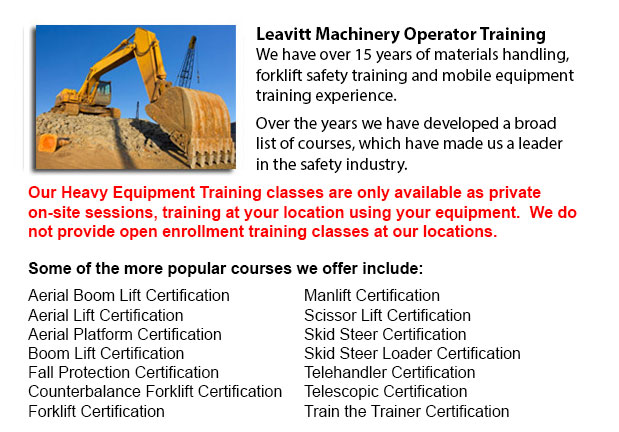
Mississauga Heavy Equipment Operator Certification - The person who manipulates the controls and drives different kinds of heavy machines is referred to as a heavy equipment operator. Most frequently, this equipment is used on construction sites to deliver and lift heavy supplies and to move earth and carry out construction tasks. Heavy industrial machinery can include backhoes, cranes, excavators and bulldozers. The operator should adhere to safety measures since he maneuvers the machine to finish his job. He can be the sole equipment operator on the jobsite or as part of a team.
Depending on the nature of the job at hand, the kind of construction machine that a heavy equipment operator uses differs. Each type of machine is built to do specific tasks in the most effective method common to the construction trade. Different types of equipment are small enough to be utilized within plants or inside of warehouses, and can be particularly designed to move boxes and pallets. Larger machinery is customarily utilized outdoors to grade land and clear areas in preparation for construction.
Lots of work projects would require a qualified heavy equipment operator, such as many public works projects and private endeavors. Public works tasks could include the construction of a bridge or roads. There are many other publicly funded projects that consist of dam construction, airport runways, power plants, municipal structures and levees. Private projects can consist of the construction of malls, office buildings, industrial parks and retail stores.
Small scale tasks will often require heavy equipment to be used within huge industrial spaces or in commercial buildings. The machines that would be utilized in this particular instance, comprises pallet jacks, forklifts and cherry pickers. Trenchers and backhoes are usually available in different sizes appropriate for jobs needing powerful and less bulky machinery.
Operators of heavy equipment would be needed to be certified by their local or regional agency. A lot of these operators are cross-trained and certified to operate many different models of heavy equipment. Others prefer to specialize in operating only one type of machinery and only require periodic updates on their operating permit certifications.
Workers in this industry are usually trained through a formal apprenticeship program offered by unions or companies or else with on-the-job training. Some technical and trade schools offer paid training programs. It is vital that employers hire fully-trained heavy equipment operators to adhere to local rules and comply with regional and local laws regarding employee safety and job conditions.
-
Mississauga Crane Training Courses
Mississauga Crane Training Courses - The heavy equipment crane is intended to move, lift and lower heavy stuff. Normally, the crane comes outfitted along with a hoist, sheaves, and chains or wire ropes. Cranes are utilized in the manufacturing, const... More -
Mississauga Telehandler Ticket
Mississauga Telehandler Ticket - The telescopic handler or telehandler is a normally utilized machine in agricultural and industrial applications. This machine is the same in look to a forklift and even works in a similar way, even though telehandler... More -
Mississauga Overhead Crane Ticket
Mississauga Overhead Crane Ticket - An overhead crane is normally used in industrial environments. Likewise referred to as a bridge crane, this equipment includes parallel runways spanned by a traveling bridge. The component that lifts materials is t... More -
Mississauga Forklift Safety Training
Mississauga Forklift Safety Training - Any person who wants to operate a lift truck has to take a forklift safety training program in order to become a certified forklift truck operator. There are various ways to acquire forklift training. Courses ar... More -
Mississauga Heavy Equipment Training
Mississauga Heavy Equipment Training - Normally, the different kinds of heavy equipment training are divided into 2 categories of equipment: those that have rubber tires and tracked vehicles. Tracked vehicles include items such as excavators, cranes,... More -
Mississauga Loader Ticket
Mississauga Loader Ticket - Loaders have been created to operate practically anywhere. They offer optimal traction and maneuverability because of a heavy-duty oscillating joint which offers 45-degree rotating angles toward the left and right, with 10... More -
Mississauga Boom Lift Certification
Mississauga Boom Lift Certification - Elevated work platforms allow maintenance operations and work to be done at levels which can not be reached by whichever other means. Boom Lift Certification Training educates workers about safely operating boom... More -
Mississauga Forklift Training School
Mississauga Forklift Training School - Why A Forklift Operator Must Take A Forklift Training School - Federal and industry regulators have established the criteria for forklift safety training based on their existing standards and regulations. People... More

Forklift Certification Mississauga
TOLL FREE: 1-888-254-6157
Mississauga, Ontario
forkliftcertificationmississauga.com
Email Us
About Us


